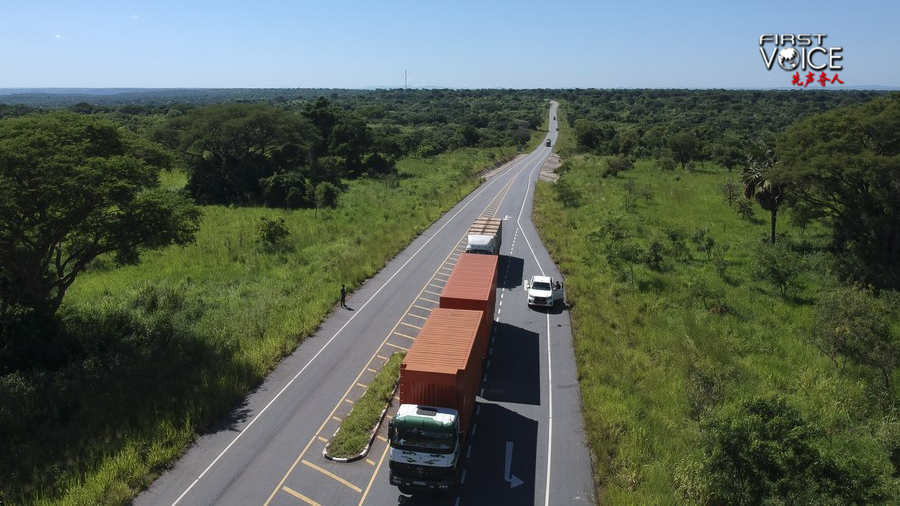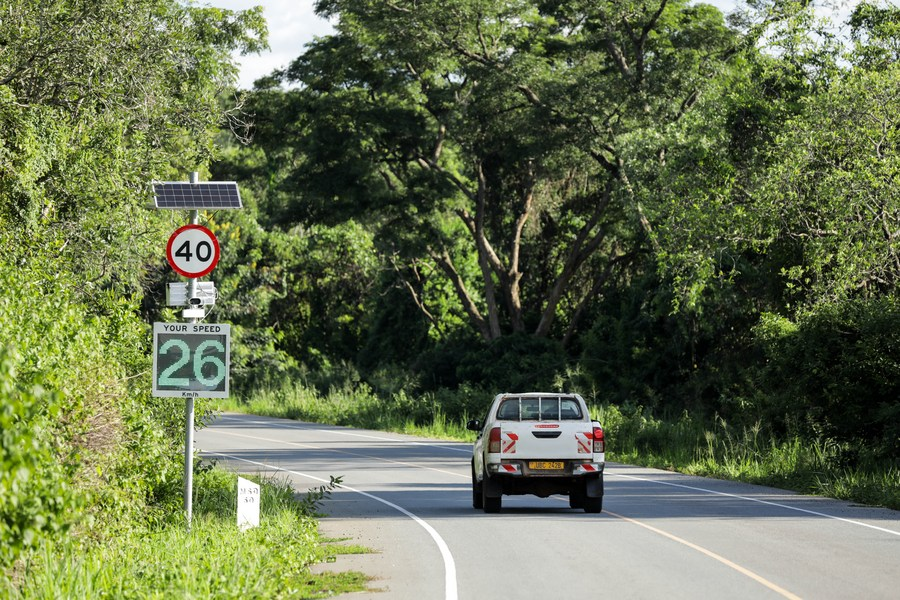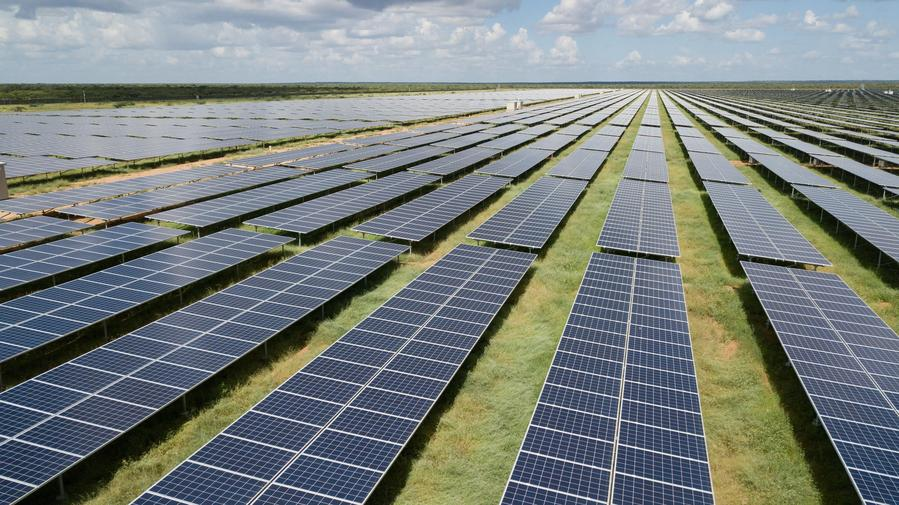
A section of a Chinese-built road inside Murchison Falls National Park in northwest Uganda, May 12, 2024. [Photo/Xinhua]
Editor's note: China and Africa share a longstanding friendship, respecting, appreciating and supporting each other consistently during the past several decades. The results of their cooperation in infrastructure development, agriculture, healthcare and education have been undeniable. However, some Western media and politicians continue to accuse China of debt traps, neo-colonialism and more. CGTN's new series "China-Africa Cooperation: Debunking Western Myths" aims to put the record straight. This is the second article in the series.
By Stephen Ndegwa
The 2024 Summit of the Forum on China-Africa Cooperation (FOCAC) will be held in Beijing from September 4 to 6. The theme of the summit is "Joining Hands to Advance Modernization and Build a High-Level China-Africa Community with a Shared Future." Leaders of FOCAC's member countries, plus the African Union, will attend the forum.
Amid toxic propaganda by Western institutions, media and politicians, China and Africa have built a formidable relationship that encompasses various sectors away from the traditional trade and diplomatic ties. These include the environment, education, culture and sports.
Ecological civilization is a fundamental principle in all Chinese development efforts, both domestically and globally. The country has scored several firsts in the fight against climate change and in tackling other environmental challenges like deforestation and marine pollution. These initiatives have been incorporated into the thinking around projects abroad, particularly in Africa which has a relatively vulnerable environment.
China has initiated solid and credible initiatives to reduce its carbon footprint in the continent. One of the flagship ecological programs is the China-Africa Environmental Cooperation Center supported by the United Nations Environment Programme, which was started in Beijing in November 2020 with the aim of strengthening environmental cooperation, in addition to promoting green investments and development.

A car passes by a speed sensor on a section of a Chinese-built road inside Murchison Falls National Park in northwest Uganda, May 11, 2024. [Photo/Xinhua]
In the run up to the eighth FOCAC ministerial conference in November, 2021, China and Africa identified green development as one of the major planks in building a China-Africa community with a shared future. In the first phase of the China-Africa Cooperation Vision 2035, China committed itself to initiate 10 projects in green development, environmental protection, and climate action in the continent. This would include supporting the African initiative "Great Green Wall" and establishing centers of excellence in Africa focused on low-carbon development and climate change adaptation.
Experts see this and similar initiatives as the brainchild behind the entrenchment of environmental assessment in the construction of the Belt and Road Initiative (BRI) projects. Firstly, every project undergoes a Strategic Environmental and Social Assessment. Secondly, Chinese experts collaborate closely with African environmental regulatory agencies to ensure that before any significant BRI projects are initiated, the environmental impact is comprehensively and reliably evaluated and approved, preventing irreversible environmental harm.
Environmental conservation measures, including carbon sinks, noise pollution barriers, water protection and management, and the construction of bridges to facilitate safe wildlife passage have become standard practice in BRI projects. Moreover, the projects also undergo gender and human rights impact assessments before implementation.

A 50-megawatt solar power farm in Garissa, Kenya, December 13, 2019. [Photo/Xinhua]
As part of its commitment to open, green and clean cooperation, the BRI incorporates many projects designated to promote clean and renewable energy such as wind farms, solar power plants, and eco-friendly transportation systems.
For instance, the Mombasa-Nairobi Standard Gauge Railway in Kenya, a major BRI project, passes through sensitive ecosystems, including national parks. In order to minimize the risk of train-wildlife collisions, the project has incorporated several wildlife corridors featuring bridges, culverts and embankments that guide animals to underpasses. Additionally, noise absorbers have been installed along these corridors to minimize disturbances to wildlife.
China has taken a lead in promoting green development in Africa as a way of reducing carbon emissions and combating climate change. The country has championed green and low-carbon growth by actively advancing the use of renewable energy sources such as solar and wind. Additionally, cooperation is ongoing towards the effective implementation of the Paris Agreement on climate change in line with the principles of sustainable development.

Children wait to board a train at the Nairobi Station of the Mombasa-Nairobi Railway in Nairobi, Kenya, October 6, 2023. [Photo/Xinhua]
Contrarily, even as the West pontificates and imputes ill motives in its anti-China propaganda, it has recorded negligible impact in helping Africa deal with its environmental challenges. In fact, many Western multinational corporations have left a trail of environmental destruction in the wake of their economic activities in the continent.
One case in point, titled, "TotalEnergies in Africa: A legacy of destruction" was cited by Greenpeace in an online report published on April 23. According to Greenpeace, "the company's relentless pursuit of profit has come at the expense of Africa's most vulnerable communities and irreplaceable ecosystems." It is instructive that while the French multinational oil company operates in an estimated 130 countries and regions, it is in Africa where its "actions have left some of the deepest scars."
Clearly, these Western companies and their concerns have no best practices or benchmarks that the rest of the world can emulate when exploiting natural resources in Africa. They have specialized in environmental conservation tokenism through corporate social responsibility initiatives that fizzle out once the bottom line is achieved.
Ultimately, accusations of a scorched earth policy by China in the "plunder" of Africa's natural resources should be seen in the light of the spirited debunked debt trap imputations a few years ago that the country supposedly ring fenced its loans using its partners' national assets like ports and airports. The allegations were seen by honest experts around the world, including some Western economic scholars and experts, as a case of sour grapes and malice.
Stephen Ndegwa, a special commentator on current affairs for CGTN, is the executive director of South-South Dialogues, a Nairobi-based communications development think tank.

 中文
中文



